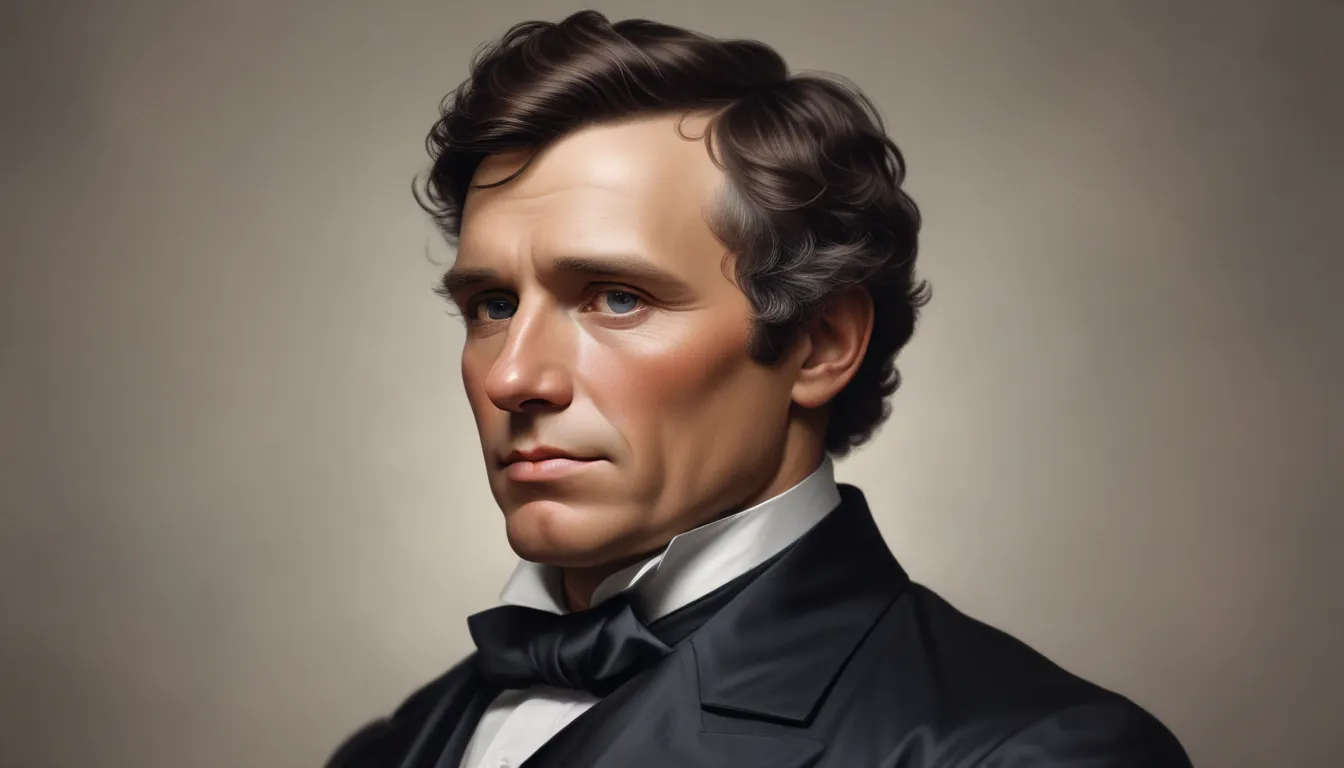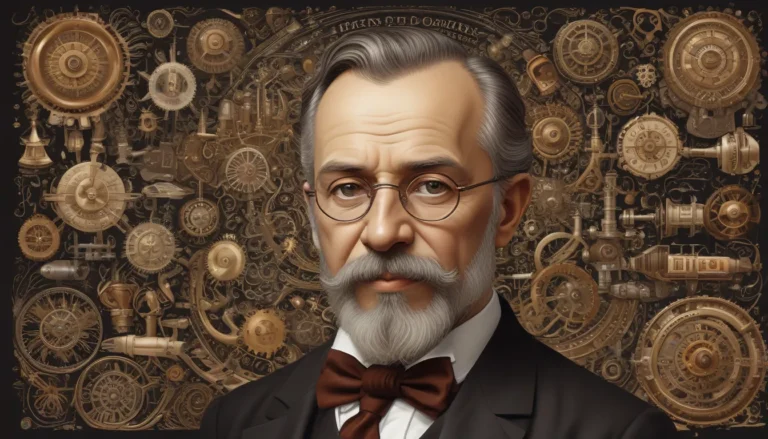The images in our articles may not match the content exactly. They are used to grab your attention, not to show the exact details in the text. The images complement the text but do not replace it.
Are you curious about Franklin Pierce, the 14th President of the United States, whose presidency often falls into the shadow of more prominent leaders? Delve into the fascinating world of Franklin Pierce as we uncover 20 captivating facts that offer a glimpse into his life, presidency, and lasting impact on American history. From personal tragedies to controversial decisions, Pierce’s story is a tapestry of complexities that shaped his legacy. Join us on a journey to explore the man behind the title and discover the lesser-known aspects of his remarkable life.
Unraveling the Story of Franklin Pierce
Franklin Pierce, born on November 23, 1804, in Hillsborough, New Hampshire, served as President from 1853 to 1857. Despite his presidency being overshadowed by other historical events, Pierce made significant contributions and faced challenges that left a lasting mark on American history. His attempts to maintain peace between the Northern and Southern states amidst rising tensions over slavery showcase the complexities of his presidency and the era in which he led.
The Early Years and Political Career of Franklin Pierce
-
Political Roots: Franklin Pierce was born into a political family, with his father, Benjamin Pierce, serving as Governor of New Hampshire. This early exposure to politics greatly influenced Pierce’s interest in public service.
-
Path to Presidency: Before assuming the role of President, Pierce served in the U.S. House of Representatives and the Senate. His advocacy for states’ rights and support for the expansion of slavery reflected his belief in maintaining the unity of the nation.
-
Military Service: Pierce’s involvement in the Mexican-American War as a brigadier general earned him national recognition. However, it also brought personal challenges, such as a knee injury that plagued him throughout his life.
Presidential Policies and Achievements
-
Kansas-Nebraska Act: As President, Franklin Pierce signed the controversial Kansas-Nebraska Act into law in 1854. This legislation allowed residents of those territories to determine the status of slavery, leading to violent conflicts in “Bleeding Kansas.”
-
Territorial Expansion: Pierce’s administration made efforts to expand the United States, including pursuing the acquisition of Alaska and parts of present-day Arizona from Mexico. Although these endeavors materialized after his presidency, they underscored his vision for a larger nation.
-
Foreign Relations: One of Pierce’s foreign policy achievements was opening trade with Japan, a strategic move that advanced the United States’ presence in Asia and strengthened diplomatic ties with other nations.
The Personal Life and Legacy of Franklin Pierce
-
Personal Tragedies: Franklin Pierce and his wife, Jane Appleton Pierce, endured immense personal loss, with all three of their sons succumbing to early deaths. The tragic death of their last son shortly before Pierce’s inauguration cast a shadow over his presidency.
-
Legacy: Despite his charisma and charm, Pierce’s presidency is often criticized for its perceived ineffectiveness in addressing the leading issues of the time. His pro-Southern views and opposition to the Civil War further complicated his legacy.
-
Post-Presidential Years: Following his term in office, Pierce traveled abroad in an attempt to escape the criticism he faced. Despite his efforts, he remained a controversial figure, reflecting the divisive nature of his presidency and personal beliefs.
Fascinating Insights into Franklin Pierce’s Life
-
Pioneering Traditions: Franklin Pierce was the first President to have a Christmas tree in the White House, establishing a festive tradition that endures to this day. Additionally, he installed the first bath tub with running water in the White House, showcasing advancements in plumbing.
-
Unique Choices: Pierce’s unconventional approach was evident when he swore his oath of office on a law book rather than a Bible, a decision that reflected his personal beliefs. His friendship with renowned author Nathaniel Hawthorne also shed light on his multidimensional character.
-
Historical Significance: Pierce’s presidency is often viewed as one of the least effective in American history, with his policies and leadership style contributing to the nation’s descent into the Civil War. Despite his failures, Pierce’s personal correspondents reveal a man grappling with the nation’s future and his place in it.
Reflecting on Franklin Pierce’s Legacy
Franklin Pierce, though often overlooked in discussions of American presidents, left a compelling legacy that invites further exploration and reflection. His life was marked by triumphs and tragedies, controversies and complexities that offer valuable insights into leadership and historical context. As we delve into the details of his presidency and personal life, we uncover a nuanced portrait of a man who grappled with the challenges of his time. Let us continue to unearth the stories of figures like Franklin Pierce, for they hold lessons and perspectives that resonate across generations.
Exploring Franklin Pierce: Answering Your Questions
Q: What set Franklin Pierce apart from other U.S. Presidents?
A: Franklin Pierce’s charismatic personality and controversial decisions, such as the Kansas-Nebraska Act, distinguish him from other presidents. Despite his charm, his presidency’s shortcomings have earned him a unique place in history.
Q: Did Franklin Pierce have any unusual pets during his presidency?
A: Yes, Pierce and his family cared for a pair of Japanese birds during their White House tenure, showcasing a penchant for exotic pets that captured public attention.
Q: What surprising aspect of Pierce’s early life might intrigue readers?
A: Before entering politics, Pierce excelled as a lawyer known for his eloquence and legal acumen, highlighting his diverse skill set beyond politics.
Q: How did Franklin Pierce contribute to American literature?
A: Pierce’s close friendship with Nathaniel Hawthorne, a renowned author, led to the dedication of a biography to him, revealing his influence on literary figures of his time.
Q: Did a specific event during Pierce’s presidency impact his historical reputation?
A: The signing of the Kansas-Nebraska Act in 1854 significantly tarnished Pierce’s legacy, sparking violent conflicts and criticism that persisted beyond his term.
Q: How did Franklin Pierce’s personal losses affect his presidency?
A: The profound grief of losing all his sons, including one shortly before his inauguration, weighed heavily on Pierce, impacting his focus and decision-making during his presidency.
Q: What lesser-known hobby of Franklin Pierce might surprise readers?
A: Pierce’s passion for horseback riding provided a temporary escape from the pressures of the presidency, showcasing a more relatable and human side to his character.
Conclusion: Embracing Franklin Pierce’s History and Legacy
As we unravel the 20 intriguing facts about Franklin Pierce, we gain a deeper understanding of the complexities that defined his life and presidency. From personal tragedies to political challenges, Pierce’s story offers valuable insights into the pressures of leadership and the tumultuous era in which he led. By exploring the nuances of his legacy, we honor the contributions and controversies that shaped Franklin Pierce’s place in American history. Let us continue to explore the stories of past leaders like Pierce, for they offer timeless lessons and perspectives that enrich our understanding of the past.






